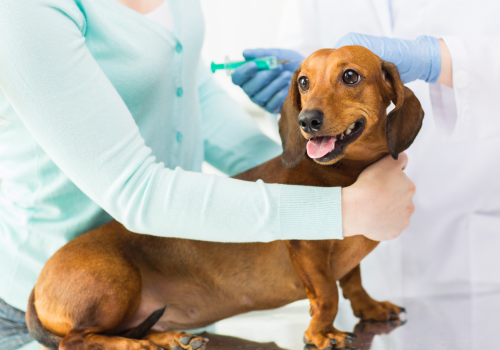Dog vaccinations are a critical part of getting your precious pet on the path to optimal wellness by preventing some harmful and potentially fatal diseases. Thankfully, you’ve turned to the internet for answers on how to protect your pet, and we’re thrilled that you found our website! At Markham Woods Animal Hospital in Longwood Florida, we work diligently to ensure you get the necessary information to keep your dog as healthy as possible. Unfortunately, there are many well-meaning pet owners online who share material that isn’t factually accurate or what your veterinarian would want you to know or do. In the case of dog vaccinations, that could be highly detrimental to your pet. That’s why we’ve taken the most frequently asked questions about dog vaccinations and answered them thoroughly and accurately so that you can keep your dog from getting some easily preventable diseases.
If you’re looking for a highly trained and compassionate veterinarian in Longwood, FL, we’d love to help you care for your dog and any other pets that you have. If your dog hasn’t been vaccinated yet, that’s the first order of business, so please call us right away at (407) 682-3233.
What exactly are dog vaccinations?
Dog vaccinations are injections that dogs are given in a series, starting in the puppy stage and extending through adulthood. They depend on the dog's lifestyle and the dog's age regarding what types and how many vaccines we will be giving. The vaccine aims to introduce tiny amounts of a virus particle that causes the body to create an immune response. This response allows the body to be protected so that if it were exposed to a certain bacteria or virus, the body would be able to mount an immune response and never become sick from that.
How do vaccinations impact the health and well-being of my dog?
The vaccines’ purpose is to ensure that your dogs don't experience parvovirus, rabies, or distemper, which is another fatal disease. A lot of puppies can be exposed early on if they are not vaccinated. These diseases are horrible for your pets to go through, and they are entirely preventable.

Are vaccinations required by law?
The only vaccine that is required by law is rabies. That is because it is a zoonotic disease, meaning that it can be spread to humans. Not only that, but it can be fatal for humans if they contract rabies. Some states require both dogs and cats to vaccinate. Some states disregard dogs, but all dogs and cats should be vaccinated for rabies because it's contracted from many different wildlife forms. If your pet isn’t vaccinated against rabies and they were to bite someone, you could be visited by the health department, required to quarantine, or worse, so the rabies vaccine is a must to protect your animal as well as to protect other people.
Does my dog's lifestyle factor into what vaccinations my veterinarian will recommend?
Yes, your dog’s lifestyle factors into what vaccinations your vet will recommend. There's a core set of vaccines that we recommend for all dogs—parvovirus, distemper, and rabies. But some other vaccines are dependent on whether the dog goes to dog parks, boarding, grooming, doggie daycare, or different situations where they are frequently around other dogs. With dogs that socialize with other dogs often, your veterinarian will likely recommend Bordetella, kennel cough, and perhaps the flu vaccine. There is also a vaccine for leptospirosis, a zoonotic disease that’s transmitted through the urine of wildlife. And if your dog hikes a lot or is outdoor for other reasons, your vet will also likely recommend the vaccine for Lyme Disease.
How soon should I get my dog vaccinated?
We typically start vaccines at eight weeks of age, although some breeders start as early as six weeks. We start vaccinating for distemper, adenovirus, parvovirus, and Bordetella (if needed for the puppy’s lifestyle) at that time. Part of that is because the puppy is beginning to lose the antibodies that the mom gives to the puppy, and you need to start having the puppy build up their own antibodies. That's also why boosters are needed, because you are protecting them in between the maternal antibodies and the puppies’ own antibodies. A puppy should be vaccinated every three weeks until they are four months of age, which is the time when they are able to mount a long-term immune response.
Some boarding facilities require Bordetella every six months, and those dogs may need to be vaccinated for six months if they are frequently boarding.
Do I really need to avoid allowing my puppy to socialize with other dogs until they are fully vaccinated?
We typically recommend not socializing with any unknown animals or in places where many unknown animals or wildlife may congregate. Most veterinarians will tell you that you can socialize with your friends’ and families’ dogs, who you know to be healthy and vaccinated—as long as they don’t have diarrhea, vomiting, or other symptoms of contagious diseases. You should avoid dog parks and places where any dog may go and leave urine or feces behind, as those are places where viruses and bacteria can be transmitted. So it doesn't mean the puppy has to be strictly isolated, but you want to be careful about who you socialize with.
Another important reminder is that a veterinarian should administer puppy vaccines. Those administered or sold at least by other corporations may not be temperature-regulated. In contrast, those that are administered in a veterinary hospital are temperature-regulated and backed by manufacturer guarantees.

Why is it important to avoid missing a dog vaccination?
The vaccine schedule is based on studies to determine the average duration of immunity in puppies.. It's incredibly critical that we stay on schedule, because if puppies are not completely covered, they can pick up harmful diseases. It’s the same with adult dogs, but adult dogs can maintain a much longer immunity time. It depends on the dog’s age and the situation, but we don't want to miss their vaccines.
The initial puppy boosters that we give every few weeks get the immune cells ready to go, and then the boosters that we administer annually or every three years continue to remind those cells of what they need to be on the lookout for.
What are the typical puppy and dog vaccination schedules?
There may be some variation in puppy vaccinations and puppy vaccination schedules depending on your situation, the dog’s lifestyle, and when you got your dog. In general, the dogs stick to a fairly strict schedule.
The puppy vaccination schedule is typically as follows:
- Initial puppy vaccines at eight weeks
- First Distemper and Bordetella at eight weeks
- Distemper, Lyme, and Leptospirosis at 12 weeks
- Lyme and Canine Influenza at 14 weeks
- Lyme, Canine Influenza, Distemper, and Leptospirosis at 16 weeks
- Rabies the following year, then every three years thereafter
- Distemper repeated every three years
- Everything else is an annual vaccine, again, to remind those immune cells
What diseases are prevented with dog vaccinations?
Prevention is a bit of a misnomer in that nothing is 100% preventable. Still, vaccinations assist and most definitely increase your odds of providing immunity and prevention of certain diseases for your pet.
The diseases that dog vaccinations prevent are:
- Parvo Distemper (DA2PP) - Distemper, Adenovirus, Parainfluenza, and Parvovirus
- Rabies
- Leptospirosis
- Lyme Disease
- Bordetella
- Parainfluenza
- Canine Influenza Virus (H3N2 and H3N8)
What is a vaccine reaction?
A vaccine reaction is an allergic reaction to vaccines in which the immune system gets overstimulated by the vaccine. Although it’s rare, it can happen.
A vaccine reaction in dogs can cause:
- Facial swelling
- Difficulty breathing
- Vomiting
- Diarrhea
- Extreme lethargy
Again, this is very rare, and the benefits of vaccines far outweigh that risk. We also have good protocols in place for managing vaccine reactions if they occur, and preventing them in the future for dogs who experience them.
The AVMA is another excellent resource for pet vaccinations. If you still have questions about dog vaccinations, please don’t hesitate to call us at (407) 682-3233 or email us at [email protected].

